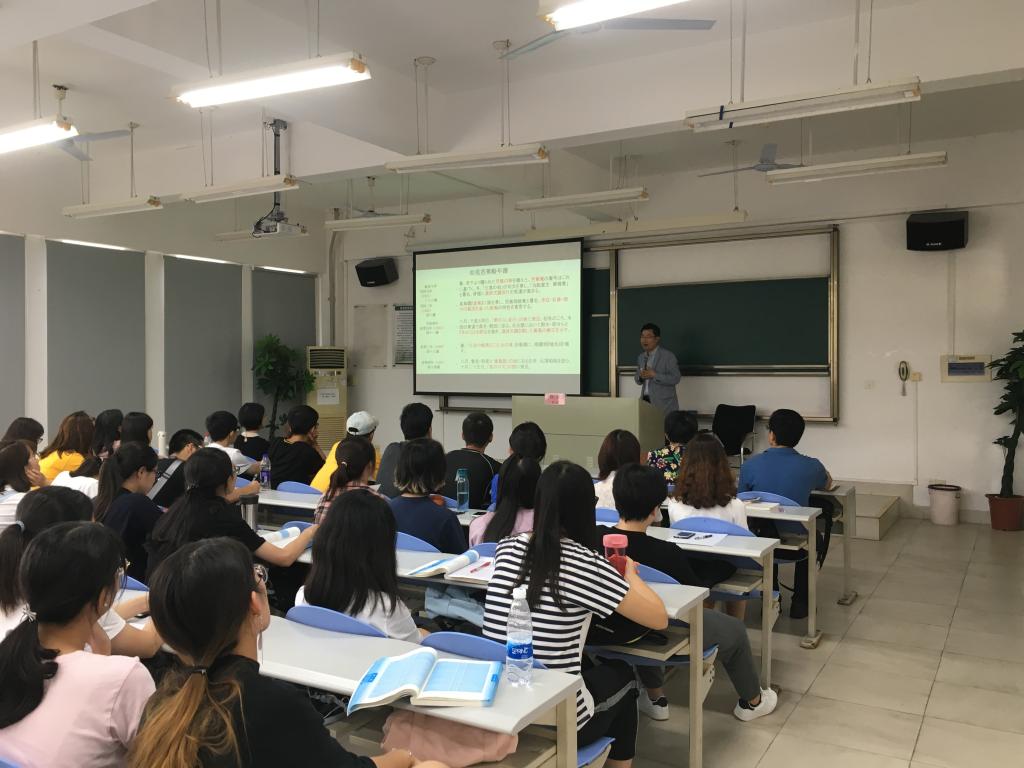本网讯(记者苏俊强)2018年10月23日下午,中山大学佟君教授受邀在励耘楼B407为外国语学院师生开展了一场名为“芭蕉与杜甫”的讲座。
佟君教授主要从“诗人”、“旅人”、“边缘人”三个方向出发,以平行对比的视角对日本诗人芭蕉与中国诗人杜甫进行分析。佟君教授首先从“诗人”的角度切入,对比了芭蕉和杜甫在诗歌方面的语言特点。无论是芭蕉的俳谐诗句还是杜甫的五言律诗,都对诗人所处的时代的诗歌发展做出了贡献。接着,佟教授又以“旅人”的角度,探索了二者各具特色的人生旅程,两位诗人都通过旅行得以丰富自己的精神世界,但是在作品以及旅行的契机中却可看出两人截然不同的态度及旅情。最后,佟君教授剖析了两人“边缘化”的过程,芭蕉是下级武士出身,君主死后才开始漂泊生活,而杜甫是在仕途失败后开始四处漂泊的,所以读者更应该深入探索二者作为边缘诗人的人生观以及对贫苦大众的态度。
佟君教授在讲座中展现出来的学术精神,影响着在座的每一位师生,也鼓励着我们在寻求知识的道路上不懈进取。
佟君教授,日本文学博士,现任中山大学华南日本研究所副所长、中山大学教授,硕士生导师,博士后合作导师,研究领域为日本古典文学、中日比较文学与比较文化等。曾出版专著、编著以及译著十余部,并主编了《华南日本研究》。
A Japanese literature lecture entitled “Poets Matsuo Basho and Du Fu” delivered by Professor Tong Jun from Sun Yat-sen University was given to the students of SFL at Liyun B407 on the afternoon of October 23, 2018.
Professor TongJun talked about Matsuo Basho and Du Fu in a comparative way through “poet”, “traveler” and “marginal man”.Professor TongJun firstly introduced the lives and poetry characteristics of the two “poets”. He compared the achievements between Haiku style by Basho and poetry with five characters reformed by Du Fu. Later on, Professor Tong shared us with the travelling lives of Basho and Du Fu. Basho determined to be a traveler at his will while DuFu was forced to lead a wandering life because of poverty and he failed to be an officer. They both enriched their mental world through traveling, but it is easy to tell the different attitudes through reading their poems. After that, Professor Tong analyzed their marginalization. Basho was once an inferior warrior and he began to travel after his liege died. Comparatively, Du Fu began to wander about as a result of being unable to be an officer. As a reader, Professor Tong said that we should pay more attention to their attitudes toward human lives and the poor.
The academic spirit shown by Professor Tong Jun affects every teacher and student attended, encouraging us to keep forging ahead in the search for knowledge.
Doctor and Professor TongJun, supervisor for postgraduates and postdoctors, was the vice-director of Southern China Institute of Japan in Sun Yat-sen University. He has intensively studied Japanese Classial Literature, Comparative Literature and Culture between China and Japan. He has published and translated dozens of academic books and he was the chief editor of Japanese Studies in Southern China.


